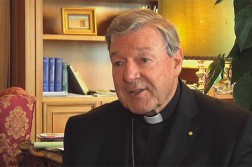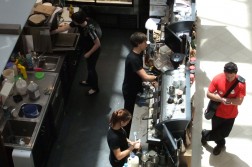Economics is a complicated matter. It has to be, so that economists can get people to talk to them. And economists’ delusions of popularity are never so strong as in Budget week, a national celebration of the very best in our society, ie money.
Every year Australians come together to celebrate the Budget in the traditional way: by reading several thousand articles titled "Winners and Losers" and whining about how there’s not enough money for child care.
This Budget was of course particularly notable for the fact it was the first one delivered by new Treasurer Wayne Swan, following his predecessor Peter Costello, who handed down 400 Budgets and by the end was so relaxed and confident he took to juggling and performing magic tricks while doing so. His final Budget in 2007 was delivered entirely in Italian.
But Swan is only a rookie Treasurer, and so naturally we can forgive him his hesitancy and occasional stumbles and the fact he looks a bit like a greyhound. The good news is that Swan is proud of his Budget, and I think that’s the main thing. According to Swan, it kicks off the "greatest modernisation of the architecture of the Australian economy…in our peacetime history", which is a relief, because to be frank, the last few modernisations of the architecture of the Australian economy were crap. Particularly during the Ralph Willis era, or as it is known among historians, "The Terror".
There are many opinions and analyses of the Budget circulating at the moment, all of them impenetrably dull and written by boring, generally worthless people. What the punters need is a simple, direct, manly guide to the Budget, one that cuts through all the spin and obfuscation and facts to get right to the heart of the matter.
The main thing people want to know about the Budget is how they’re being screwed and the best way to complain about it.
The Government is, of course, focused on "working families", so lonely unemployed people are in the gun, and frankly it’s about time they got what’s coming to them. This is why, for instance, the Aged Pension has not been increased; because pensioners don’t work, and most of them have no family due to their relatives all dying off or cutting them out of their lives due to the bitterness over the old people’s appalling parenting. And so old people get nothing, and the natural balance is maintained.

Thanks to Bill Leak
The other big losers from the Budget will be those earning over $150,000 a year, as they will no longer be able to receive the baby bonus. It is naturally upsetting for one to find this out, and I think I speak on behalf of all those earning under $150,000 a year when I say: hahahahahahahahahaha. This is known as "the politics of envy", and while it is true that the Government’s Budget is based on nothing more than a desire to punish success and attack those they do not like, it is also true that rich people are horrible.
"But Ben," I hear you say, in loud, braying tones, "$150,000 a year isn’t rich. Why, we have our struggles like anyone else!" Which is true; for one thing, the Budget includes an increase in the luxury car tax, and if that doesn’t fire a big flaming arrow straight through the twitching heart of the Australian Dream, then I don’t know what does. This could be a precursor to cutting public funding for private schools, which would in many ways signal the end of civilised Australia as the population is washed away by an unstoppable tsunami of angry letters about how many overseas holidays people have given up in order to give their children the best possible chance at becoming insufferable snots. But I digress.
The point is, there is a real danger, as we know, in Budgets like these that remove benefits and raise taxes for the wealthy. The danger is that you will eliminate the incentive to be rich. Our capitalist society depends on people wanting to make lots of money, and when you take away minor welfare and make rich people pay more taxes, they won’t want to make money any more. If we continue down this path, people will give up being rich. "It’s too hard," they’ll say. "What’s the point in being rich, if you can’t be a little bit richer? I’m off to Centrelink to live the $300-a-fortnight good life." And thus capitalism will collapse and we will be absorbed into a minor Chinese province, just as Kevin Rudd planned all along.
It is important for the observer to note that the spending cuts are about more than hating rich people and pensioners; they are designed to fight inflation, which is running at around 4 per cent, a level considered quite high in Australia, even though in many countries it would be evidence that the economy had fallen into a volcano. This is why the Government has worked very hard to achieve its Budget surplus of $21.7 billion, and why Wayne Swan and Kevin Rudd are at this very moment rolling around naked in a bathtub full of hundred dollar notes.
But it’s not all doom and gloom. Perhaps the best news from the Budget is that $40 billion will be pumped into three huge funds for capital investment in infrastructure, health and education. What this will mean in practical terms is as yet unknown, but no matter what we get, at least we’ll know it was expensive, and that should make us feel quite relaxed and comfortable about whatever bi-weekly literacy tests or drive-through triage centres loom on the horizon.
The most important thing to keep in mind is the Budget is not just a set of abstract figures on a few million sheets of paper; it is about living, breathing Australians. It is about you. This country is more than just an economy; there is also sport. And that’s why it’s important that you, the ordinary, inarticulate, unattractive citizens of Australia, let the Government know what you think of the Budget.
So go ahead, right now. Don’t let highly intelligent columnists do all the opining, make sure your own stupid ideas are heard. Lift up your voices, in the name of budgetary democracy, before it’s too late!
Donate To New Matilda
New Matilda is a small, independent media outlet. We survive through reader contributions, and never losing a lawsuit. If you got something from this article, giving something back helps us to continue speaking truth to power. Every little bit counts.



